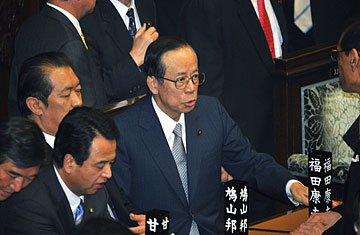
Japanese Prime Minister Yasuo Fukuda, center, speaks to a fellow lawmaker at the lower house of Parliament in Tokyo on March 19
It's official: amid a bout of global financial instability not seen in years, Japan, the world's second-largest economy, has no central bank governor. Toshihiko Fukui, the current Bank of Japan (BoJ) chief, has packed his bags—his five-year term ended at midnight, March 19—and due to a political deadlock in Japan's parliament, it may be weeks before a successor is appointed.
Of course, this doesn't mean the country is facing economic chaos. Central bank policies will continue to be carried out by Masaaki Shirakawa, who was approved by parliament last week as a deputy BoJ governor and who will temporarily take over for Fukui. But the Diet's inability to compromise with Prime Minister Yasuo Fukuda and choose a new bank chief is seen by many as unsettling evidence that Japan has reached political gridlock and could face serious problems in the months ahead. "This is the kind of thing harms the image of Japanese governability," says Jun Iio, director of the policy research center at the National Graduate Institute for Policy Studies in Tokyo.
The gridlock stems from elections last summer in which members of the Democratic Party of Japan (DPJ)—the country's main opposition party—won a surprise majority of seats in the Diet's upper house. The results were a sea-change for Japanese politics. For five decades, the Liberal Democratic Party (LDP) had complete control of the Diet and Japan's administration. But while some hailed the DPJ triumph as a much-needed step toward a true two-party democracy in Japan, in reality the power shift has been anything but cathartic. Since he took over as Prime Minister on September 25, Fukuda has been unable to get much accomplished because his key initiatives, including an attempt to resume a Japanese military mission supporting U.S. anti-terrorism operations in Afghanistan, have been delayed or blocked altogether by the DPJ-controlled upper house.
The central bank debacle is just the latest example of paralysis. After months of bickering over Fukui's successor, DPJ politicians last week rejected Fukuda's first nominee, BoJ deputy governor Toshiro Muto, and this week shot down his second choice, Koji Tanami, the governor of the Japan Bank for International Cooperation. Both Muto and Tanami are former Ministry of Finance (MOF) officials; the DPJ says it won't accept a former MOF bureaucrat as central bank chief because it wants to ensure the independence of the central bank and to insulate monetary policy from meddling by the administration.
The squabbling comes as the U.S. central bank chief, Federal Reserve Board chairman Ben Bernanke, is scrambling to shore up shaky financial markets. Among other actions, Bernanke this week helped prevent the bankruptcy of a major brokerage house, Bear Stearns, and cut U.S. interest rates 0.75 of a percentage point to try to keep America from slipping into recession. But in Japan, there's little central bank activity, despite the threat of recession, a sliding stock market, and the decline of the dollar to its lowest level against the yen in 13 years. "At this moment the situation is very bad and it will take time to settle a normal relationship between the LDP and the DPJ," says Iio, a professor of government. "The situation is critical for Prime Minister Fukuda."
Observers say Fukuda is expected to put forward another nominee later this week or early next week. But some worry that Japan has already lost a lot of international credibility by leaving the position vacant. "The key take-away from all this is that Japan does not deserve to be part of the G7 anymore," says Jesper Koll, president and CEO of Tantallon Research Japan, which is part of a Singapore-based hedge fund. "As the world of global finance faces its biggest challenge in over a generation, the world needs leadership. Instead, Japan is offering nothing but petty politics."
